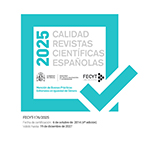Los más pequeños toman la palabra: La Escuela Infantil que a ellos les gustaría
Resumen
El derecho a ser escuchado y participar en aquellos asuntos que afectan a los niños es un derecho fundamental de la infancia escasamente respetado por el adulto, quien tiende a silenciar su voz, infravalorando su visión y posible aportación. Ante esta realidad, la Escuela Infantil se erige como un marco privilegiado para la escucha y la participación de la infancia en aquellos temas que les afectan, contribuyendo a la formación de ciudadanos democráticos. A partir de un marco de escucha donde se concibe al pequeño como un sujeto activo, competente y experto en su propia vida, se ha llevado a cabo una investigación que ha adoptado el formato de estudio de caso, en la que se ha recogido a través de las técnicas del dibujo y de las conversaciones con niños, la visión que poseen los más pequeños sobre la Escuela Infantil, analizando el bienestar del niño en el contexto escolar, el sentido y finalidad que los niños otorgan a la escuela; el grado de satisfacción con la misma; sus gustos y preferencias en el contexto escolar; la autonomía y libertad que dicen poseer en la escuela; su visión sobre los aspectos organizativos que rigen el funcionamiento del centro y su perspectiva sobre cómo es y cómo les gustaría que fuera la participación de las familias en la escuela. Finalmente, se recogen sus propuestas de mejora para hacer de la Escuela Infantil a la que asisten su escuela ideal. Los resultados del estudio ponen de manifiesto la demanda de los niños de una Escuela Infantil diferente a la que conocen y la existencia de un pensamiento divergente del pensamiento adulto que es necesario escuchar y tener en consideración, siendo sus aportaciones de gran valía para poder iniciar procesos de innovación y mejora educativa.Descargas
Descarga artículo
Licencia
La Revista Complutense de Educación, para fomentar el intercambio global del conocimiento, facilita el acceso sin restricciones a sus contenidos desde el momento de su publicación en la presente edición electrónica, y por eso es una revista de acceso abierto. Los originales publicados en esta revista son propiedad de la Universidad Complutense de Madrid y es obligatorio citar su procedencia en cualquier reproducción total o parcial. Todos los contenidos se distribuyen bajo una licencia de uso y distribución Creative Commons Reconocimiento 4.0 (CC BY 4.0). Esta circunstancia ha de hacerse constar expresamente de esta forma cuando sea necesario. Puede consultar la versión informativa y el texto legal de la licencia.











